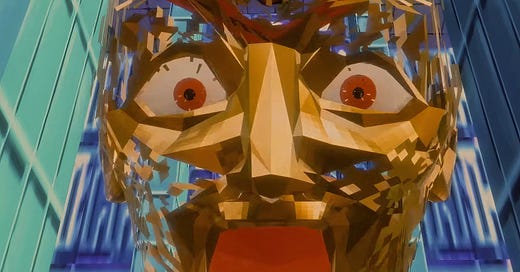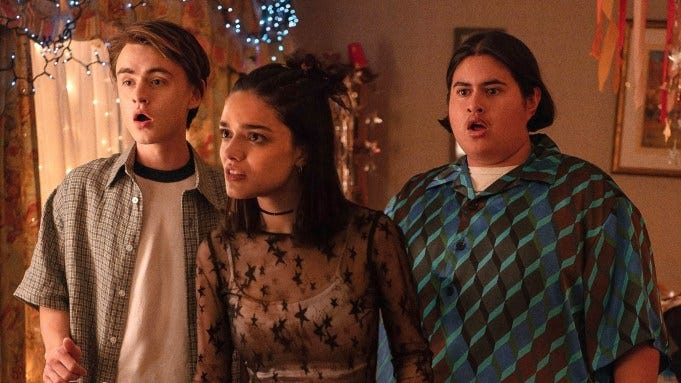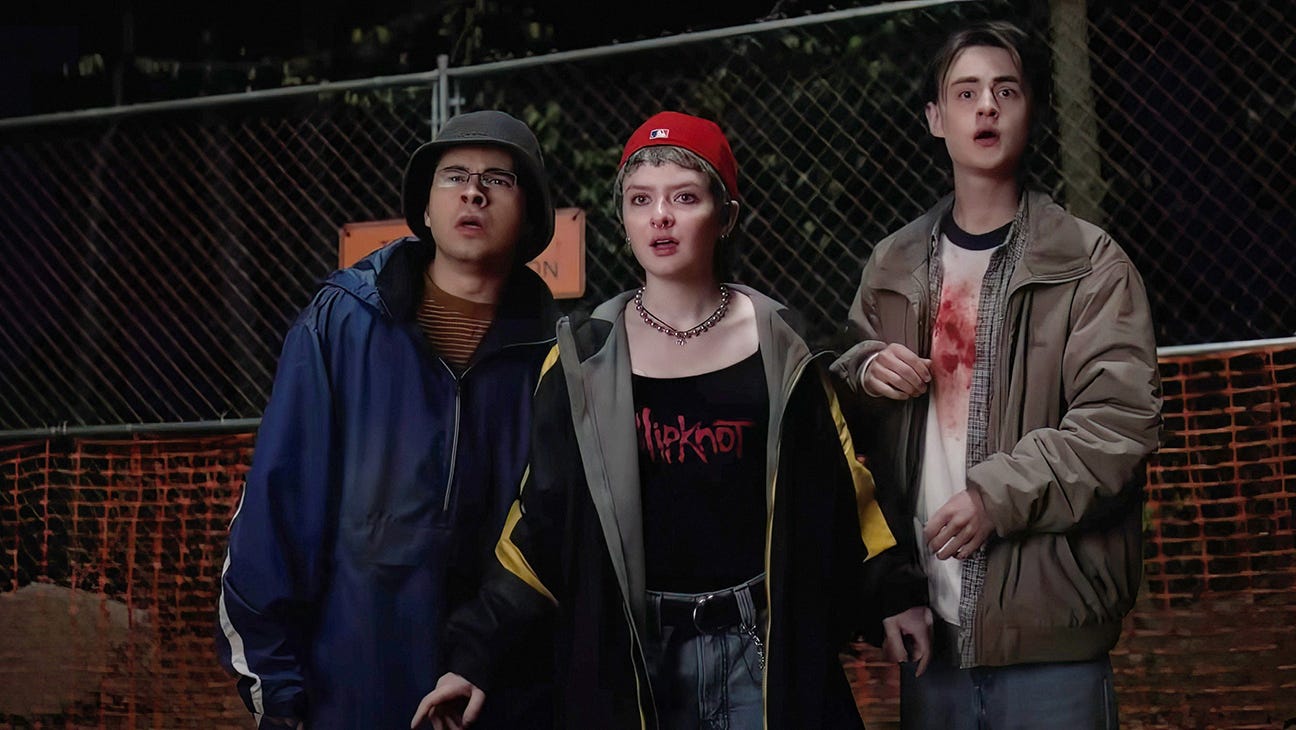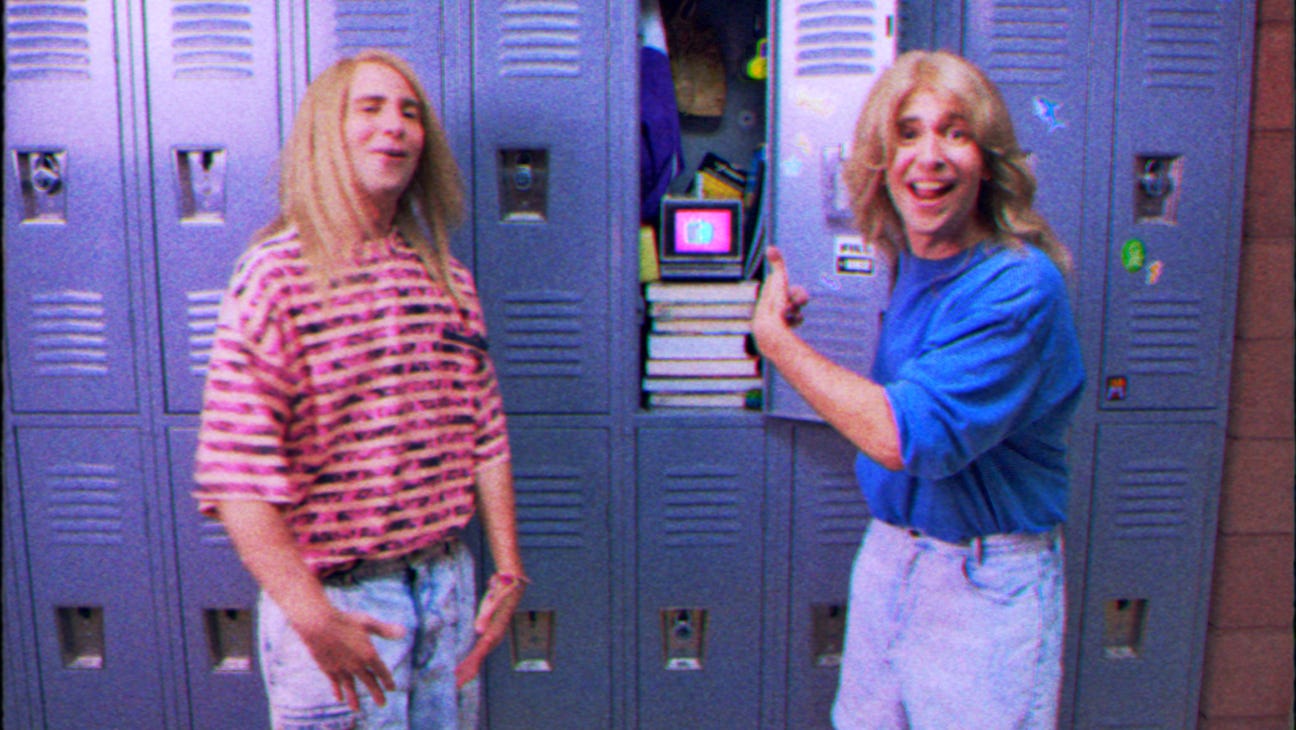I don’t really have a preamble for this one. I was two years old when the events of this film took place, and while I don’t recall my parents’ VCR trying to strangle me with a rented Bambi VHS at the time, I can’t well and truly confirm if Y2K is based on a true story or not. Sorry.
Y2K stars Jaeden Martell as Eli, a teenage outcast living in the year 1999, and who harbors a sizable crush on popular girl/computer extraordinaire Laura (Rachel Zegler). He and his best friend Danny (Julian Dennison) head to a high school New Year’s Eve party in hopes of gerrymandering more social capital and — in Eli’s case — kissing Laura at midnight. But when the year 2000 hits at midnight, all the town’s electronics end up gaining sentience with a touch of bloodthirst to boot, and the teens find themselves fighting for their lives.
There’s a cut of Y2K that works, and I would even go a step further and say that that cut is the one that A24 thought they were getting. Kyle Mooney isn’t one to phone it when it comes to screenwriting, and — with Brigsby Bear and Saturday Morning All-Star Hits! in mind — he’s clearly operating in a space that he’s familiar with (namely, one defined by technological, emotional, and media-centric nostalgia).
Y2K has the added bonus(?) of being directly informed by the current state of the world. I don’t know about the rest of you, but this digital, economic, and political trajectory has made it difficult for me to imagine any sort of future. I can only assume that this struggle is exponentially worse for the teenagers of today, who frankly have every right to be worried that, in a sentence, the future is not for them.
But what if the future wasn’t for anybody? What if technology — in many ways the great equalizer — suddenly brought about the end of the world as we know it? Would the horror of watching your friends and neighbors succumb to these homicidal machines not even be slightly balanced out by the relief of having that existential girth lifted off your shoulders? How can the world not be for you if it’s not for anyone? How might that further interact with the anxiety faced by so many teenagers who feel like they don’t belong amongst their peers?
And indeed, you can see glimpses of this thread often enough in Y2K. The teens bicker about high school social stratification on their way to the Kollective, its horror-comedy sheen directly nods to the tension-release of an uncertain future nullified by a terrifying-but-neutralizing apocalypse, and many of the character deaths serve to sever surviving characters from whatever sense of belonging they did have, forcing them further into this newly-neutralized world where they have to rely on each other’s humanity like never before.
But I’m getting ahead of myself. Unfortunately, we can’t just talk about the cut of Y2K that works; we also need to talk about the one that we got. Still, I wouldn’t buy someone telling me that 93 minutes was the projected runtime from the jump; the plot beats get way more precedence than the connective tissue that overwhelmingly informs the heart of the film, resulting in character dynamics that seem pretty disjointed and artificial. I do suppose that all interactions are artificial in the grand scheme of our individual desperation for connection; a plight that would only be exacerbated by the infrastructural anarchy of a robot apocalypse that more-or-less does away with the social dangers/obstacles that stifle our quests for that connection. Or maybe the producers just thought that teens (Y2K’s target audience, most likely) wouldn’t sit through a longer runtime?
Whatever the case, it’s Mooney’s comedy that takes the biggest blow here. The pathos that so often comes with horror is almost entirely absent here, but Y2K can get away with that, as enough of those dramatic beats still inform the cerebral line that the film is playing upon (see: certain character deaths). Still, that leaves the comedy to do most of the heavy lifting tension-wise, and the setting of Y2K doesn’t offer enough of a safety net for Mooney’s comedy to work the way it does in his other projects.
What do I mean by that? Consider the aforementioned Saturday Morning All-Star Hits!, Mooney’s Netflix-original adult animated miniseries and — for my money — the single most underrated piece of media on that platform. The comedy in that show doesn’t abide by a traditional tension-and-release relationship, but it still works because that tension is nevertheless present.
How so? Well, the show is a parody of those old Saturday morning cable programs where a bunch of cartoons air side-by-side with upbeat adult hosts getting their audiences hyped for the next cartoon:
For those of us that grew up with these programs, we know exactly what to expect from the cartoons and from the live-action segments, right down to the crunchy editing. But we also know that this is a satire of these programs, ergo we know that Mooney is going to say/do/write something completely unhinged in the context of this children’s network program, and so we’re constantly waiting for an unhinged thing to happen, and then laugh when it does.
In this way, Mooney doesn’t need to build tension because the presence of this Saturday morning programming sheen automatically creates our expectations; all Mooney has to do is subvert what we expect from these programs to make the comedy work. He takes it a step further by veering into darker territory alongside the comedy, which makes the tension even more dynamic.
But he doesn’t have that crutch here in Y2K. Even if it is a horror-comedy about dishwashers enslaving humanity, it’s still a live-action film that’s abiding by a traditional narrative and somewhat-grounded characterization, and so there’s no specific precedence that Mooney can subvert solely with his dialogue about weed and sex, thereby rendering his jokes ineffective.
This approach works in Superbad (a film that stars Jonah Hill, who, perhaps uncoincidentally, produces Y2K), but it only works because that film’s dialogue is so explosively relentless and diegetically central, that that dialogue becomes the precedence that it simultaneously subverts. We know Seth is going to decimate the raunch barrier; we’re just waiting to see how far he takes it.
Y2K, by contrast, doesn’t fly far enough off the handle with its dialogue, and even if it did, it would still get drowned out by all the other bells and whistles that populate the film (the apocalypse, the robots, the murder, these ideas of adolescence and belonging and the soul-crushing weight of the future, etc.).
All in all, it’s a disappointing directorial debut from Mooney, though I would still consider its existence a win. For one thing, it gave me the opportunity to talk about Saturday Morning All-Star Hits!, which I highly recommend queueing up on Netflix at your earliest convenience (or even inconvenience), and it at once emerges as a top-notch loot film (a loot film, being a movie that’s lucrative in theory but lackluster in execution, and is therefore a fantastic film to steal ideas from).
Most importantly, it ostensibly gave Mooney some important perspective on his own artistry, which he will hopefully take as an opportunity to grow as a filmmaker. I can say with steely confidence that a fully-realized Mooney would be an indisputable win for the film and television scene at large, so I look forward to seeing what he does next.









I have infinite love for S.M.A.S.H. on Netflix. And Kyle Mooney is a delight -- I'm actually mad in advance that the coming fiftieth anniversary SNL special will probably spend NO time on Mooney's eight years on the show in favor of a cameo by, like, George Clooney or someone who similarly has very little to do with the actual show.
It occurs to me that Mooney is nostalgic for endings, particularly the ones imposed artificially -- shows going away or being cancelled, character inexplicably growing out of what the viewer expects. I don't get the sense from Y2K that there's a real ending for Mooney to fixate on. It doesn't work. I don't even know if he can direct. This was a huge bummer, mostly because it felt like Mooney hiding his freak flag a little. Wish he wouldn't.
Fromtheyardtothearthouse.substack.com